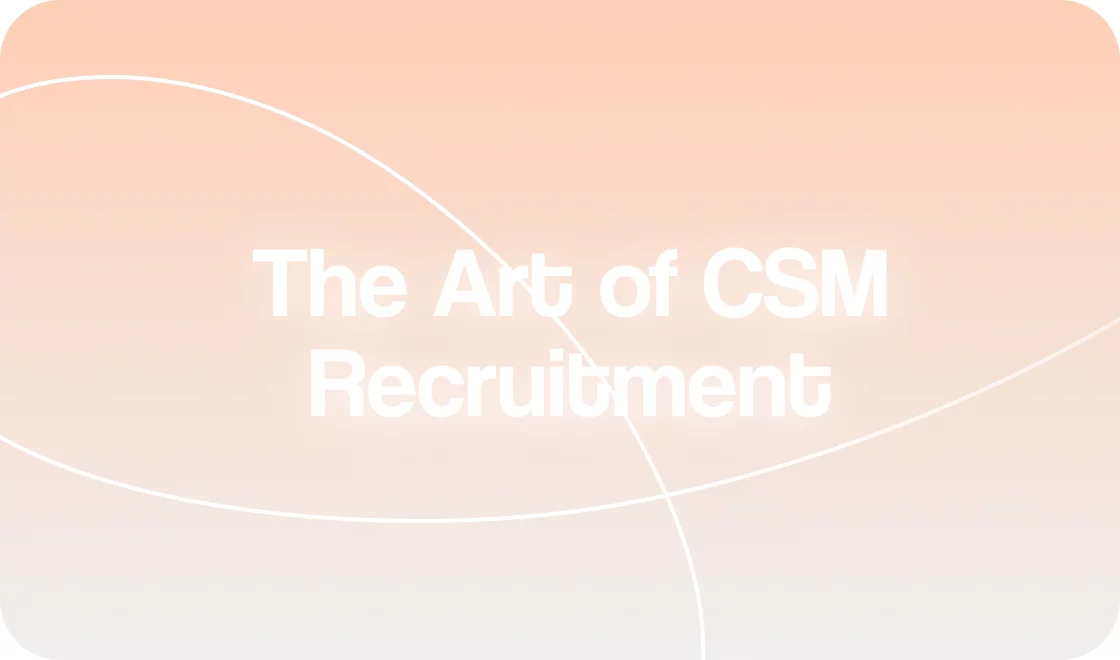04. Article Maranda – Mastering the Art of CSM Recruitment
The biggest challenge when it comes to hiring a Customer Success Manager isn’t a lack of great talent (trust us, there are plenty of outstanding CSMs). It’s the fact that finding them feels like looking for a needle in a haystack.
The Bureau of Labor Statistics reported 44.4 million quits and 19.8 million layoffs in 2023. While you might think this creates a flood of candidates, the reality is it doesn’t make things easier.
TWhen you post a job, you’re hit with a wave of applications — potentially thousands. The average corporate job opening gets 250 applicants, but one company we know received a crazy 3,500 resumes in just a week.
The problem is, lots of employers see the CSM role as an easy fill. They don’t realize it demands a specific set of skills and traits that not everyone possesses.
They’re thinking too broadly. They aren’t considering the nuances that make a CSM great. And it’s piling even more onto hiring teams’ already jam-packed schedules.
So…
- Amidst a sea of similar-looking applications, how do you spot the A-Players?
- How do you efficiently identify who’s worth your interview time?
- And how can you make this call without diverting your focus from other responsibilities?
CS leader (and former HR leader) Maranda Dziekonski currently serves as the Senior Vice President of Customer Success & Ops at Datasembly and as a Board Advisor at CSM Practice, and she’s got some insights for us.
Industry heavyweights struggle just as much as the small players.

Large enterprises might have an advantage when it comes to resources, but they still struggle with the same hiring challenges as smaller fish. According to Dziekonski, the sheer volume of applications is remarkably overwhelming.
“It’s very time-consuming to sift through. I posted a role and I had 1,500 applications in hours, within hours, 1500! So then I have to sift through to figure out which of the candidates have the right qualifications to move forward. I usually do it in the evening because I can’t get it done during my regular course of the day”
How did the industry land in this pickle, though? We’ve spent quite some time exploring this issue and identified three key reasons:
- Popular job boards don’t have the nuanced application filtering and matching settings the CSM position needs.
- The standard resume format doesn’t provide enough information to determine whether a CSM candidate is the right one for a specific role.
- As a result, hiring teams get swamped with applications and often have to sort through them manually. If meticulously going through 30 applications can take an hour, imagine tackling 300 (or 3,000). That’s like reading “Ulysses” five times over, though we think that’d be a much more engaging activity!
The end result: Sifting through the incoming applications takes weeks, dragging out the time to hire and ramping up pressure on CS leaders.
A CSM’s impact should be tied to revenue.
Think about the job search from a candidate’s perspective. “I’ve sent my application and heard nothing back. What do I do?”
Shoot another one off to a different company. And then another. And another.
In an endless loop, hiring teams are buried in applications, so they can’t respond quickly or effectively. And candidates think they aren’t getting noticed, so they send out more.
Candidates applying en masse makes it impossible to find the right candidates. To simplify the process when searching for the right CSM, Dziekonski says you need to focus on revenue-generating outcomes.
“It’s all about revenue. I want CSMs in my org that have owned revenue or have been closely tied to revenue outcomes. It is a big thing right now if a CS organization is not tied to revenue outcomes. Somehow they fall in the cost of goods sold in on the P&L, which makes them incredibly vulnerable, especially during a time when the boards are heavily focused on efficiencies and getting to profitability.”
Fact of the matter is, the CSM is a revenue-generating role. Retention, upsells, cross-sells, and renewals all contribute to top-line growth, and that’s where the CSM makes their mark. So that’s where the initial focus should be when sifting through applications.
Soft skills are the strongest predictors of future success.

That’s especially compared to standard box-ticking requirements, like education and years of experience.
According to Dziekonski, predicting a CSM’s success in revenue generation for your company goes beyond just eyeing these chronological details. What you should really focus on are the soft skills and personality traits that best lend themselves to customer success.
“Hiring right now, it’s not as much of ‘Does the candidate have the right qualification?’. It’s not about whether they check the two to five years of customer success experience, have owned renewals (check), have owned upsells (check), etc. Because then you end up with hundreds of candidates that check all those boxes. To distinguish the best candidates, you need robust processes to glean important insights. What about leadership for example? What about some of the soft skills?”
Does your ideal candidate need to have a sharp analytical mind, be a data whiz, or be a total “people person”? Should they have a knack for crafting processes and managing projects?
The specific CSM archetype needed for generating profit and growth heavily depends on your company, but for simplicity, you can divide archetypes into three groups:
- Customer relationship and advocacy builders
(customer-obsessed, naturally empathetic and proactive)
- Strategic experts and advisors
(business thinkers with consultant mindset, driving strategic value for customers)
- Data geeks and process optimizers
(detail-oriented and process-driven, efficient at handling data)
You have to determine which profile you need before explaining to your hiring team what to look for in resumes. Typically, one candidate fits best into one group, sometimes into two, but very rarely into all three.
Is it possible for someone to evolve their CSM archetype?
A person’s archetype is deeply rooted in their psychology, experiences, and the culture they’ve absorbed. These aren’t things you can flip a switch on, so it’s crucial to have a solid process in place to assess these factors before you hire someone.
That said, changing them definitely isn’t impossible. As Dziekonski puts it, the key here is the individual’s eagerness to learn and grow.
“I think the ability to learn is key. And if you have this ability and hunger to evolve as a human you will be able to adjust everything from how you react in stressful situations, how you communicate, how you make jokes.”
Is it possible to understand to what extent a person possesses a trainable mindset?
Certainly. It’s not so straightforward, but here’s one piece of advice we can offer: seek out individuals who have reshaped industries throughout their career paths, remained within them, and found success in each.
This signifies a breadth of perspective, perception, viewpoints, and a willingness to solve emerging problems. And isn’t that what you’re looking for?
How can businesses determine the right soft skills beforehand?
Can there be such a thing as the holy grail of hiring, where you can determine how well a person will fit a role before the hiring process?
While it may be tempting to find a magic formula for determining the perfect CSM candidate, unfortunately, there is no one-size-fits-all solution. Each company has its own unique culture, goals, and customer base, and their ideal CSM candidate will vary as well.
That said, there are certain traits and behaviors that can help indicate a strong fit for the role of CSM.
Here’s a specific set of tips on how to determine if a candidate is right for you with just one glance at their resume:
- Assess the candidate’s ability to build and maintain customer relationships and act as their advocate. Look for descriptions that emphasize direct customer engagement and feedback initiatives, such as “spearheaded a customer advocacy program” or “led customer satisfaction improvement projects”.
- Evaluate their strategic advisory capabilities and expertise. Look for experiences or achievements indicating their role in providing strategic counsel, such as “contributed to key strategic decisions for client success” or “served as a strategic advisor to enhance product utilization and ROI for major accounts”.
- Gauge their strength in data management and process optimization. Look for evidence of analytical skills and a systematic approach to improvement, like “developed a data-driven framework for customer insights” or “led a process optimization project that resulted in increased efficiency”.
At Talentway, we spent 6 months working with 100+ CS leaders to develop an advanced job-matching technology for CSMs. It considers baseline factors like years of relevant CSM experience, number of accounts managed, average ARR per account, and many others. But it also factors in candidates’ positioning within 10 different CSM archetypes and 5 types of corporate culture.
The Talentway team extends heartfelt thanks to Maranda Dziekonski for sharing her expertise and insights and supporting our mission to shape the future of hiring in Customer Success and beyond.


